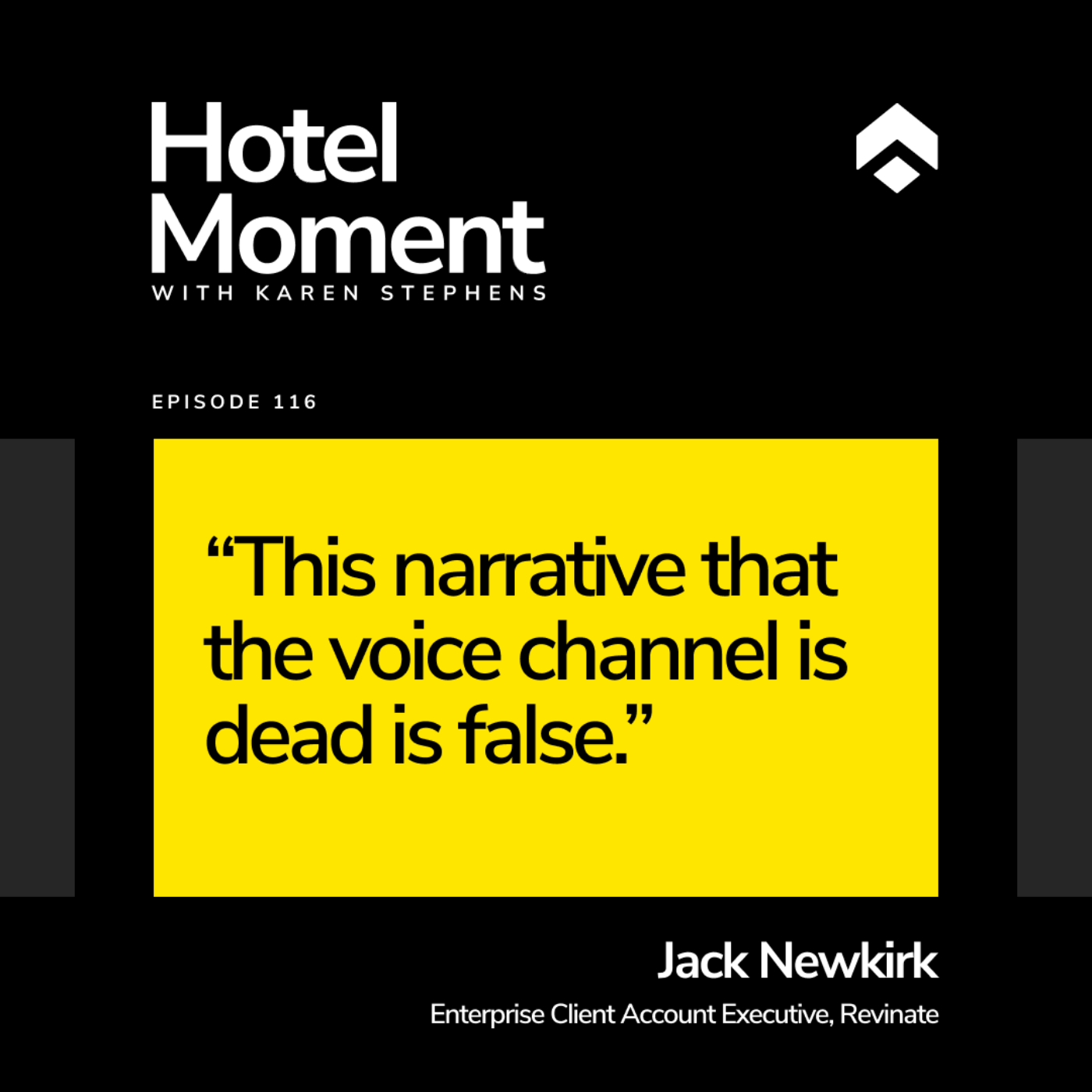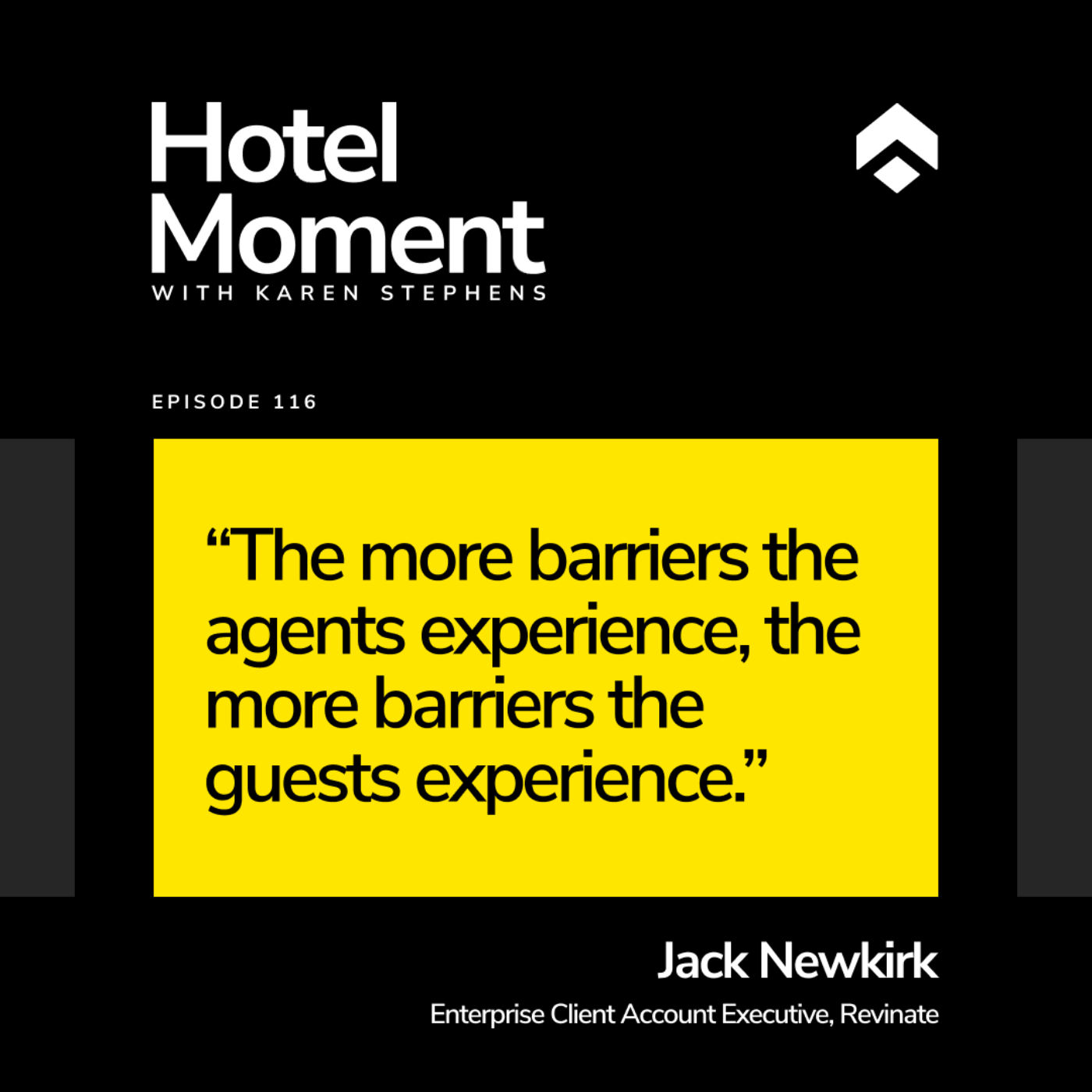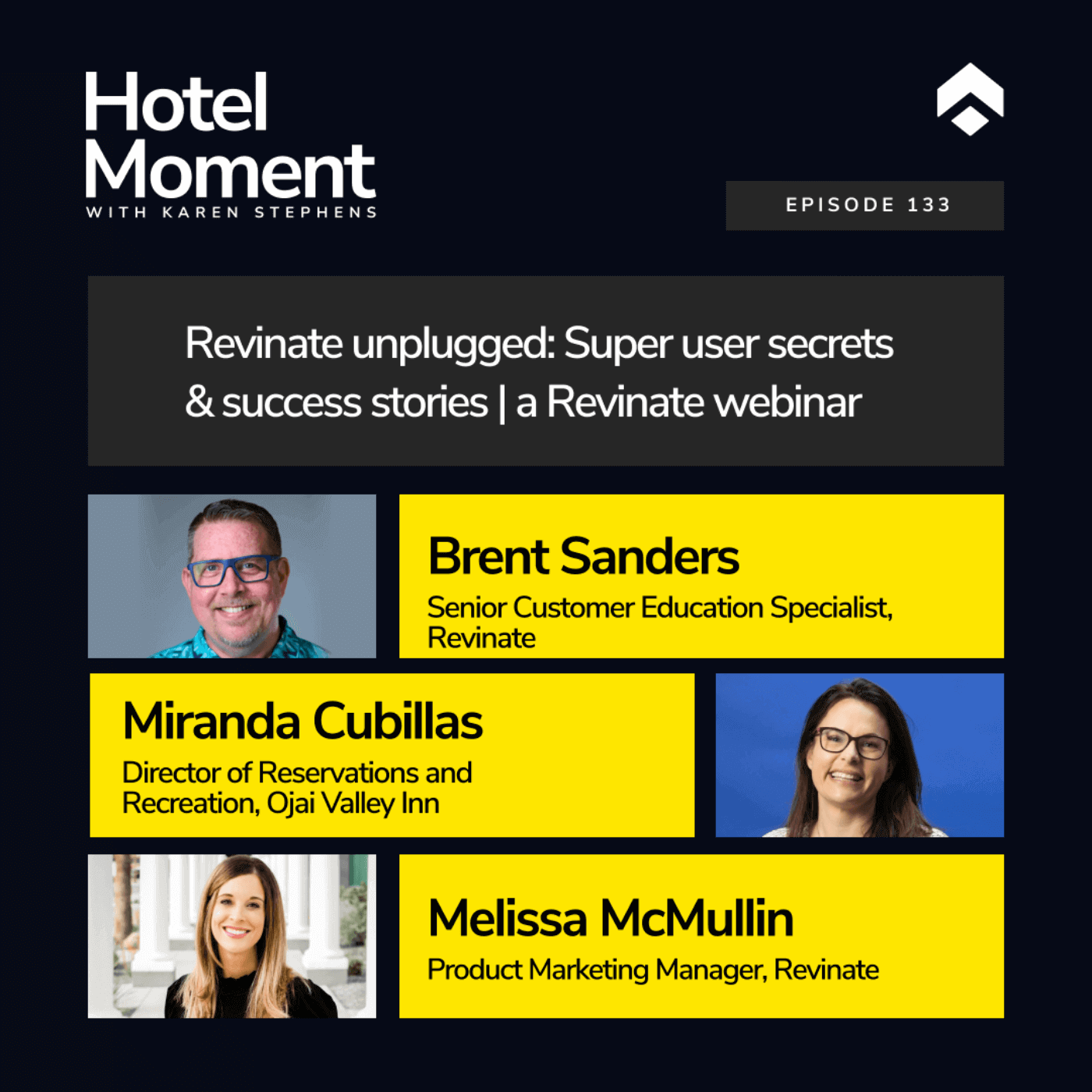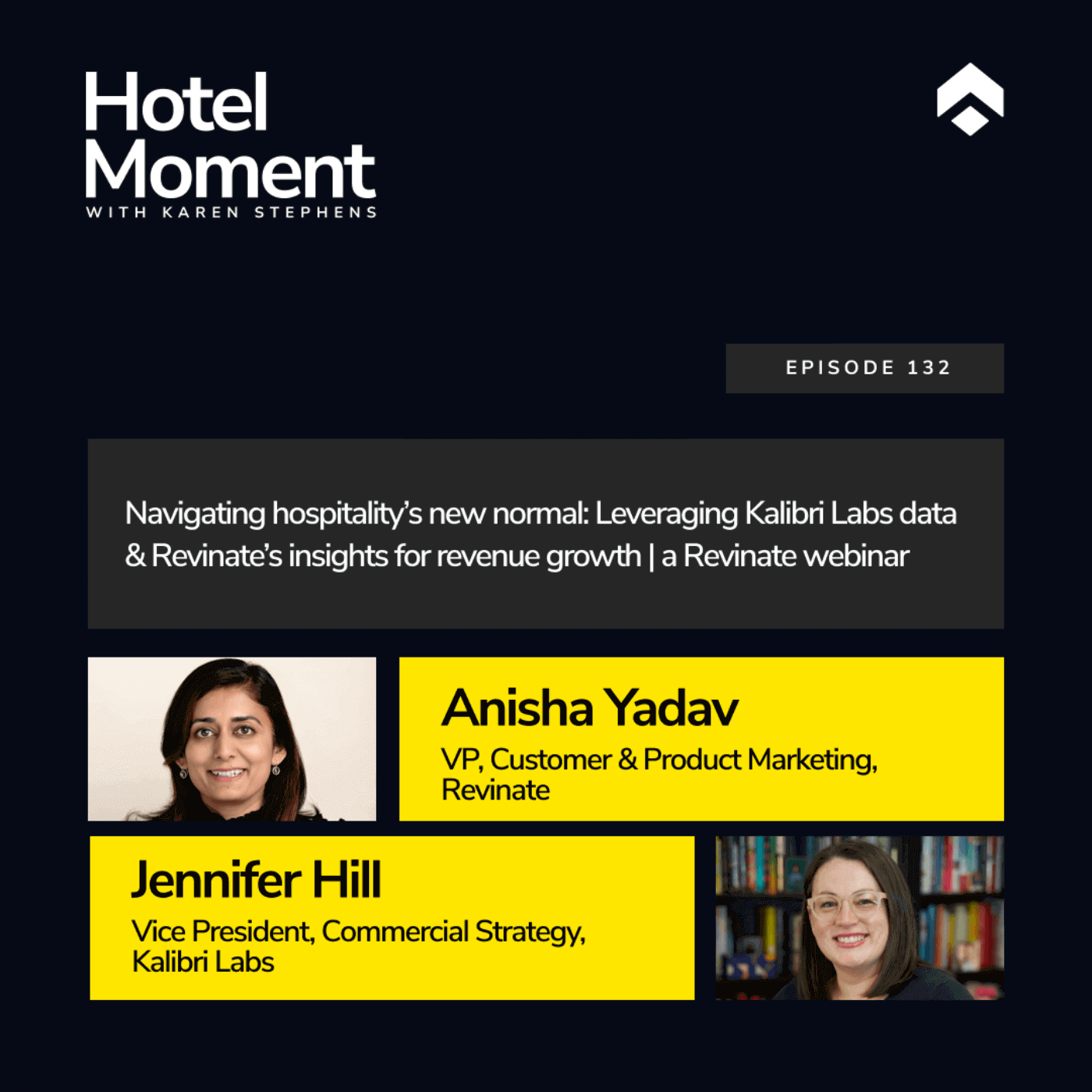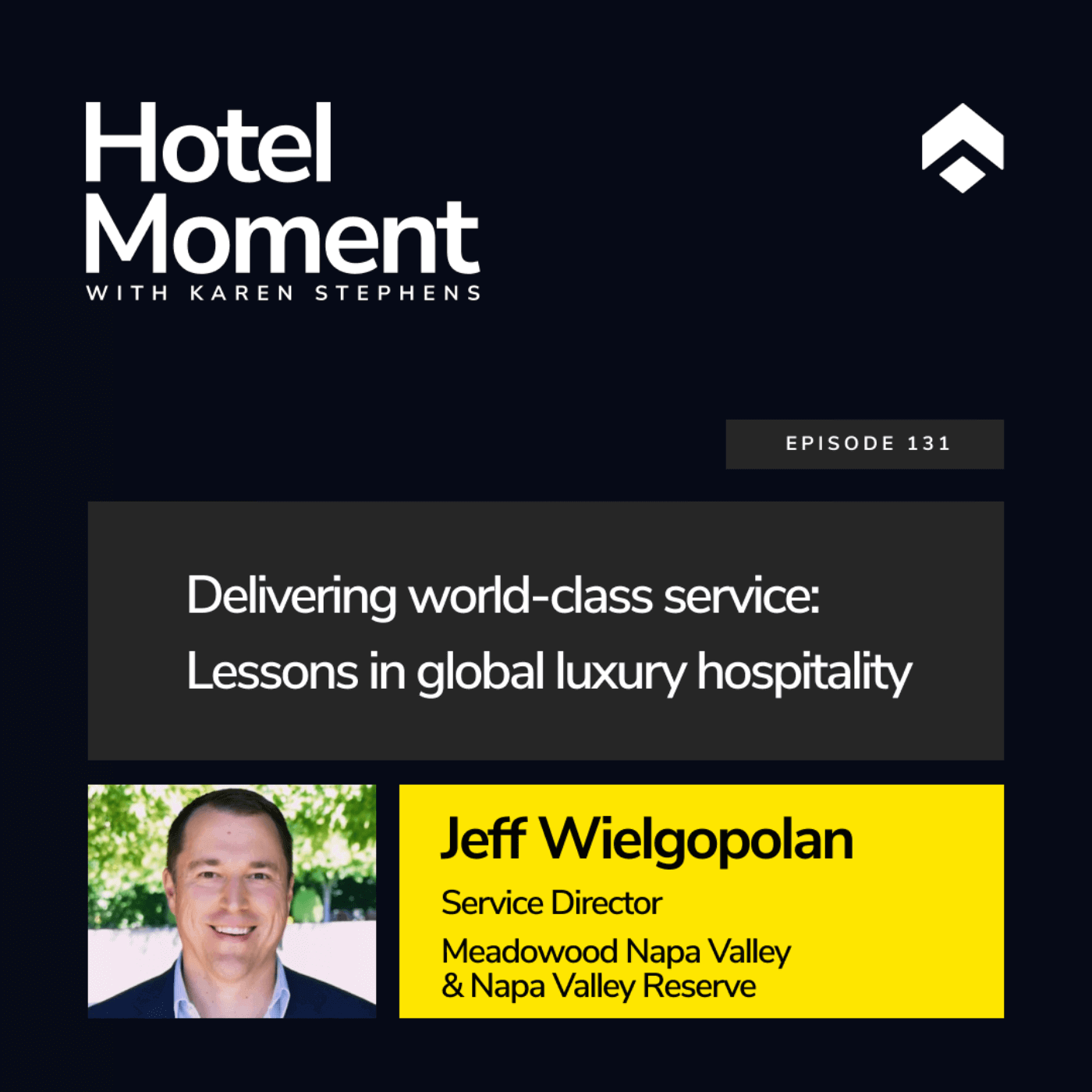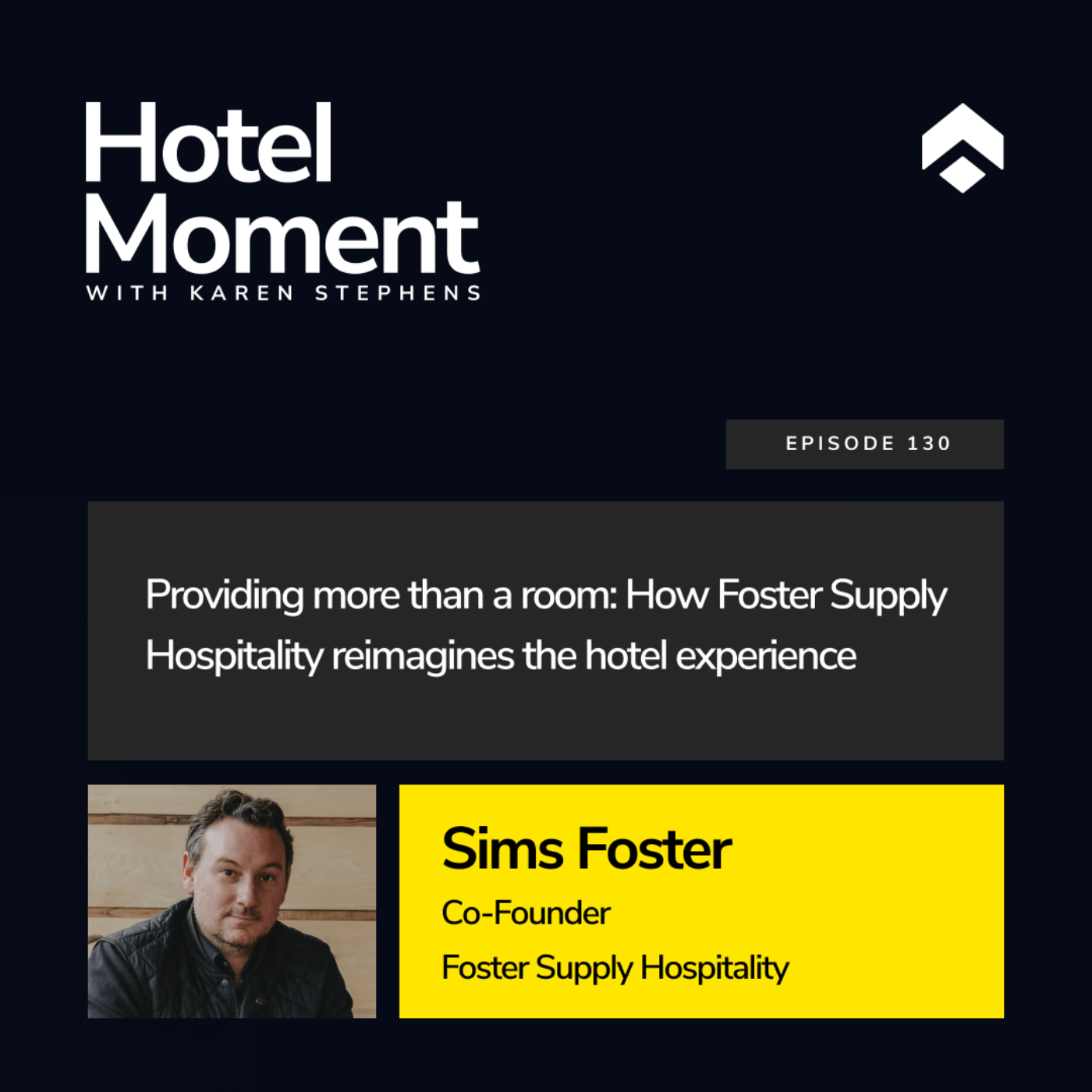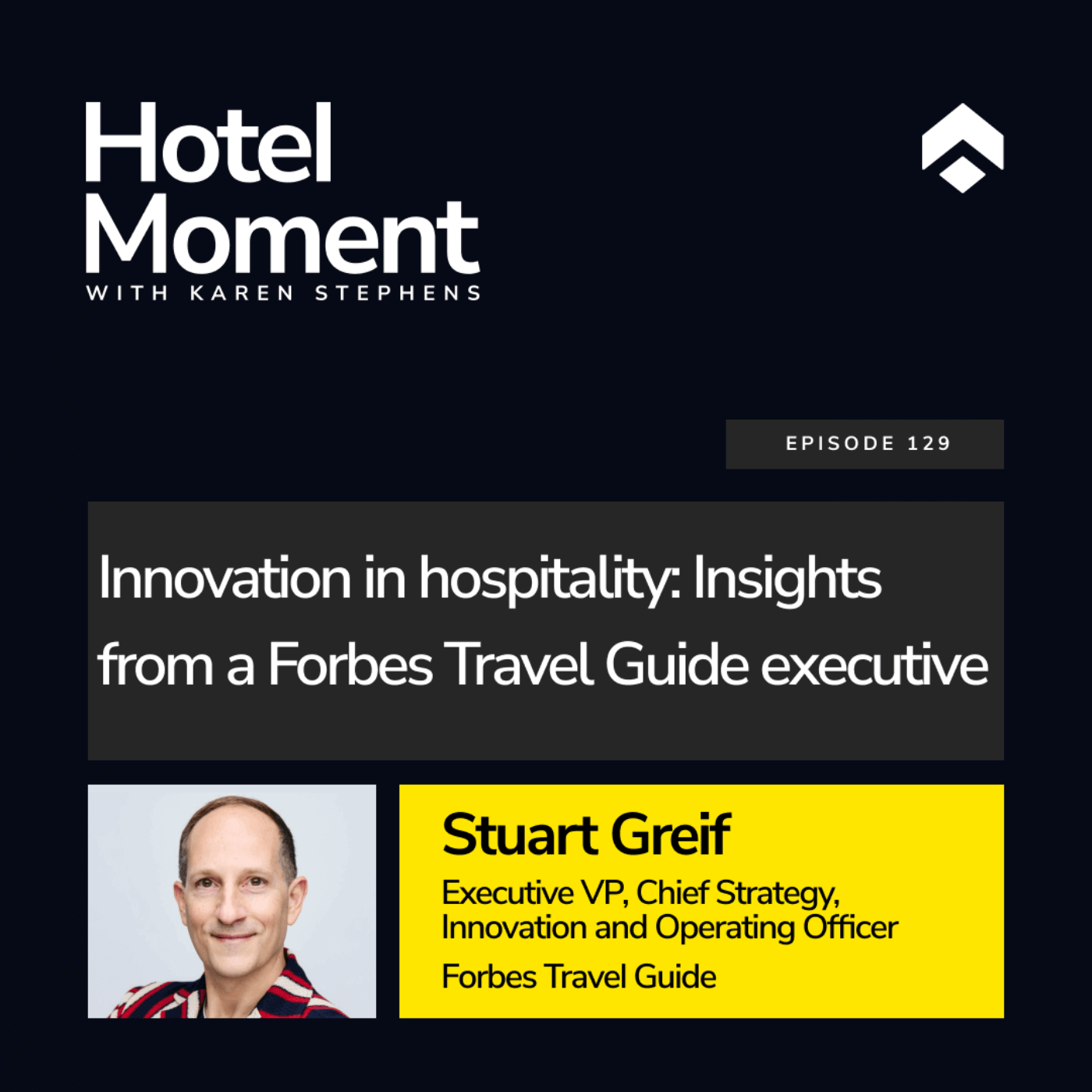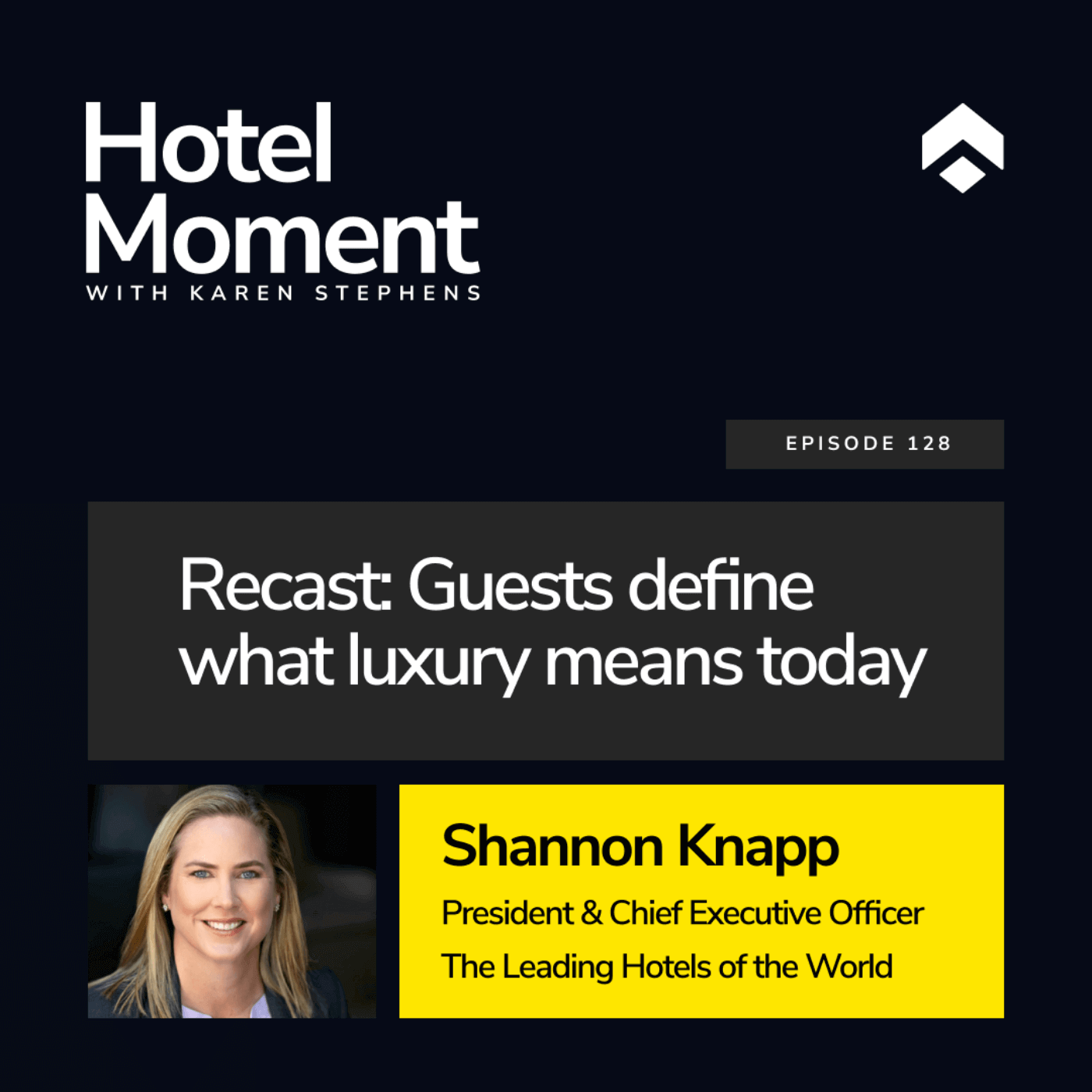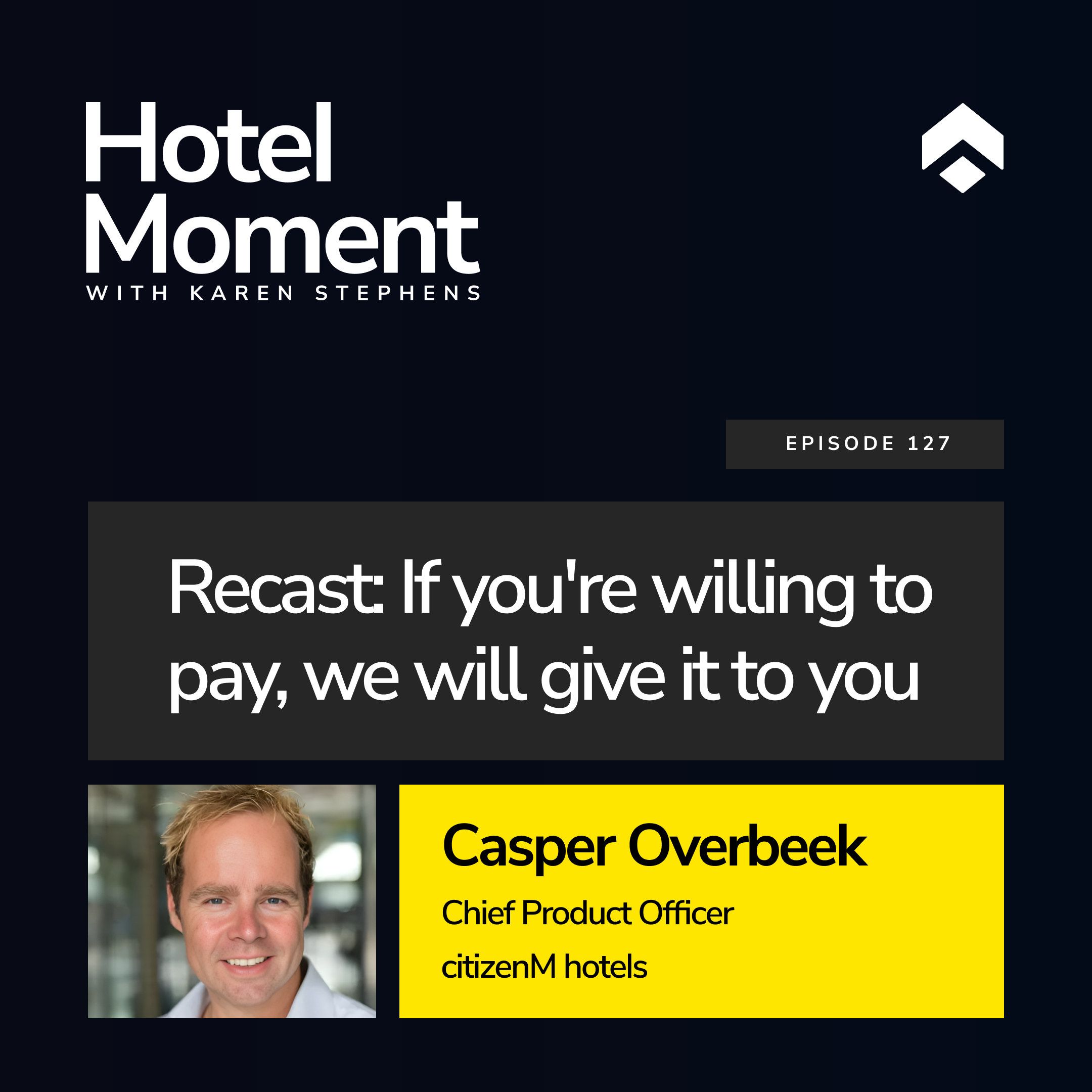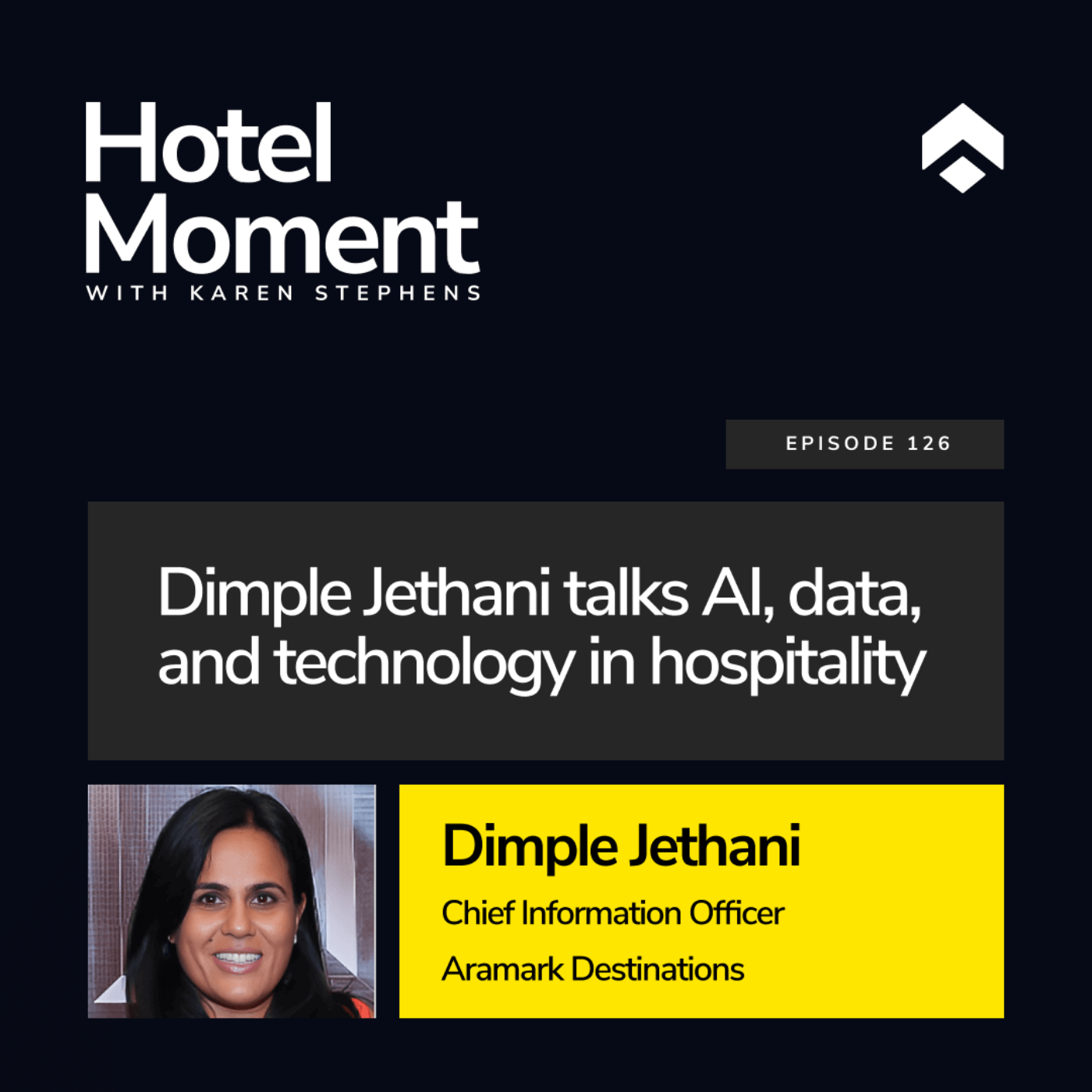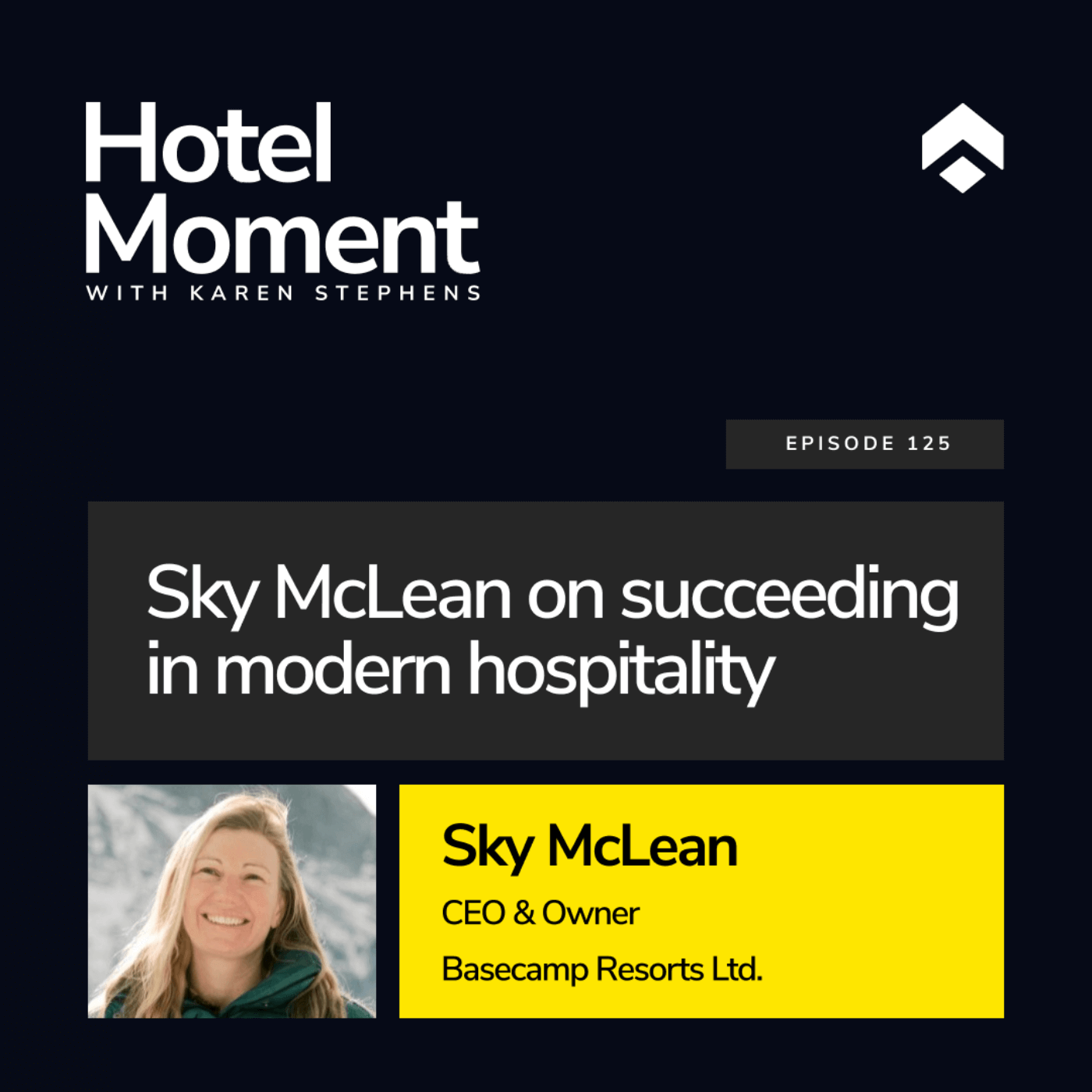Hotel Moment
WITH KAREN STEPHENS


Episode 116
Voice of opportunity: Turning caller inquiries into revenue strategies
In this week’s episode of the Hotel Moment podcast, we’re featuring a webinar from our webinar series, Hotel Moment Deep Dive.
Revinators Melissa McMullin, Product Marketing Manager, Jack Newkirk, Enterprise Sales Consultant, and Dominic Donatoni, Senior Enterprise Client Sales, crack open the treasure chest that is the voice channel — dispelling the misconception that “voice is dead.” The two explain why hoteliers are at a unique inflection point to maximize revenue and data collection from this thriving communication channel. Dominic and Jack also provide solutions on how hoteliers can remove barriers in the booking process to create a better experience for reservation agents and guests.
Tune in and find out how to empower your reservations department to research their full performance potential and drive more direct bookings with data-driven strategies.
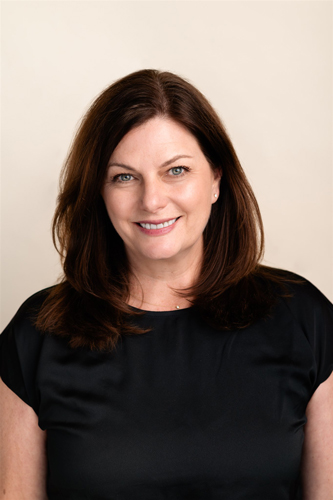
Meet your host
As Chief Marketing Officer at Revinate, Karen Stephens is focused on driving long-term growth by building Revinate’s brand equity, product marketing, and customer acquisition strategies. Her deep connections with hospitality industry leaders play a key role in crafting strategic partnerships.
Karen is also the host of The Hotel Moment Podcast, where she interviews top players in the hospitality industry. Karen has been with Revinate for over 11 years, leading Revinate’s global GTM teams. Her most recent transition was from Chief Revenue Officer, where she led the team in their highest booking quarter to date in Q4 2023.
Karen has more than 25 years of expertise in global hospitality technology and online distribution — including managing global accounts in travel and hospitality organizations such as Travelocity and lastminute.com
Watch the video
Transcript
Jack Newkirk – 00:00:00: The narrative that the voice channel is dead is being predominantly driven by those who would seek to profit the most from people not booking over the phone. I’m talking about OTAs and booking engine providers. They’re not evil. They’re very necessary, and they’re very helpful and useful. But this narrative that the voice channel is dead is false.
Karen Stephens Intro – 00:00:25: Welcome to The Hotel Moment podcast presented by Revinate, the podcast where we discuss how hotel technology shapes every moment of the hotelier’s experience. Tune in as we explore the cutting edge technology transforming the hospitality industry and hear from experts and visionaries shaping the future of guest experiences. Whether you’re a hotelier or a tech enthusiast, you’re in the right place. Let’s dive in and discover how we can elevate the art of hospitality together.
Melissa McMullin – 00:00:57: Hi everyone, and welcome to another The Hotel Moment Deep Dive presented by Revinate. I want to thank you for joining us for today’s webinar, “Voice of Opportunity, Turning Color Inquiries into Revenue Strategies.” At Revinate, we’re dedicated to helping our global customers capture more direct channel revenue, and we currently have customers throughout the U.S., Canada, Mexico, Latin America, the Caribbean, Scotland. And we’re now expanding into the UK, and Australia, and New Zealand. So our goal today with this webinar is to help you think differently about the voice channel because we’ve seen it proven to be extremely profitable. In fact, in the countries we currently serve, the voice channel is the highest ADR for direct bookings, and that’s why we’re so passionate about helping our customers drive new revenue. So let’s go ahead and get started with introductions. My name is Melissa McMullin, and I am a Product Marketing Manager here at Revinate, and I will be helping moderate today’s session. We’ve got two great presenters. First is Dominic Donatoni. Dom, would you like to give a quick introduction?
Dominic Donatoni – 00:01:55: Yeah, thank you for having me. One of the big things when I look back to my experience —- 21 years in the industry — almost 10 years at Revinate, one of the things that I’m most passionate about is one, the industry in and of itself, and finding ways to drive performance, and really make us more of a proactive industry. And I think that’s a big piece of what I enjoy and really why I love being with Revinate.
Mellisa McMullin – 00:02:19: Great. And we also have Jack Newkirk. Jack, go ahead and tell us a little bit about yourself.
Jack Newkirk – 00:02:24: Thank you for the opportunity, Melissa. I appreciate it. Been with Revinate for coming up on eight years in the industry for about 18. Started out in Australia, moved all over the place. My path took me out of operations because I wanted to have weekends and evenings off, and put me back into the support and technology side, which is where I feel like I’ve really had an opportunity to blossom. I speak fluent math, and I bring that to bear for my clients on a daily basis as we seek to unlock the potential that is in many cases locked up within their people and within their data. So I get a lot of satisfaction out of that, and super happy to be here today.
Mellisa McMullin – 00:03:00: Great. So our agenda today, we’re going to be breaking it into three sections as it relates to the voice channel, removing barriers, empowering teams through performance measurement, and data capture and revenue analysis. So let’s begin with removing barriers. So guys, we have the guest booking journey. So can you walk us through that and how it relates to the voice channel?
Dominic Donatoni – 00:03:22: Yeah, absolutely, Melissa. So, you know, one of the things that I love is because it does talk about the personalization of the booking journey. And it’s not just that one person. I’m going to have a different journey, a different expectation every single time I plan a trip, whether it’s with just my wife, whether it’s with my 7 and 10-year-old. They’re always going to be different. Based on the location, based on lots of being offered, what’s important to my kids at that moment in time. And so the biggest piece that what I really love to really drive home when I look at this is, one, you can tell it’s a circle. Once that guest books doesn’t stop there, you want them to have a great experience, have a great post-day conversation, and get them right back into that awareness and stay top of mind. And so I think when you look at every single of these stages, all five. In between each of those bubbles are incredible, valuable opportunities to capture the data. And I think the more you can capture and understand and activate that data on all of those sections gives more confidence, gives more value, which is then going to drive loyalty and revenue. But, Jack, what is your thoughts?
Jack Newkirk – 00:04:50: Speaking specifically, removing barriers, there’s two types that we talk about. There’s barriers stand between the guest, and completing their booking. And then there are barriers that stand between your agents, your team, and nurturing that guest through the booking process. So let’s start small. Let’s start with the guest. We talk — you talked about this being a circular process. It’s not a linear process. Between each one of these five stages, there’s another circle in there where they’re making decisions like, “Oh, we’re researching, and we’re inquiring, and we’re researching, we’re acquiring. Okay, we finally made the booking. But now we’re preparing. Should we get the upgrade? Should we not? Should we rent the golf cart?” Whatever it is. So there’s these barriers that we want to remove to make it easy for guests. As my old boss said, “Our job is to make it easy for our guests to give us their money.” Remove barriers, allow them to flow through this process more easily by also removing the barriers that the agents face. So what are those barriers? I don’t know, maybe your agents work at the front desk, and they’re answering reservation calls while trying to check in 19 people while the elevator is broken down, and there’s a child on fire over in the corner, or whatever it would be. Those are all things that create an environment in which agents are not allowed to thrive. It could be something as simple as having dual monitors, for example, or even being able to listen to their own recorded phone calls after a hectic day to understand where can I be better? Where can I improve my craft? And make our guests tire better. So while I talk about there’s two different types of barriers, they really are intertwined. And what I’ve found as a GM and as a corporate level director, and as a consultant is that the more barriers the agents experience, the more barriers the guests experience because they cannot be taken care of. And our job is to remove those along this very nonlinear journey. And I think, you know, one of the things that our industry doesn’t do well at is understanding and gathering the data to even identify what those barriers, what’s not working, what’s not working. Right. And maybe sit there. and you I mean, I’ve been a GM before and, you know, I look back and I’m like, “Oh, my gosh, I could have been better driven, better performance, not sat there and gone. Oh, you know what? Front desk. Yep. There’s a line. But, you know, at that point, we’ll call back. Well, yeah. Well, I don’t know. And you’ll call back after they’re done calling your competitor and the spouse. And then what? And then that’s just going to cost me more.” Right? So that guest acquisition cost is obviously a big factor, too. And you take into account where are they putting that data? They don’t have something to capture it in with all of these different touch points. We talked about the personalization. Does personalization or data points? Is it a notepad that’s sitting at their desk? And God forbid that there’s somebody that comes in and throws that away. A Post-it. Post-it falls off the computer screen and goes into the garbage inside. Now, there’s no one winds up in this industry on accident. Like no one accidentally becomes a front desk agent, or a reservation sales professional, or a concierge, or a bellman, or a revenue manager. We’re all in this because we’re interested in hospitality because we want to take care of other people. And that there’s a lot of frustration that can build when there’s an earnest desire to do better. But I don’t have the tools to do it. I don’t have the leadership in place to help me be better. I don’t have accountability measured just that is in place or the visibility of performance. And it’s expensive. I think we’re going to talk about that in performance management. We’ll talk about how expensive that is. But at the end of the day, to the other types of barriers, reduce the guest barriers by creating a seamless process. Ensure that process remains seamless by empowering your own team.
Melissa McMullin – 00:08:31: Absolutely. So thinking about all those various touch points throughout the journey and knowing that voice channel is the most profitable direct booking channel. Why do you think there’s still some perception that the voice channel is dead?
Jack Newkirk – 00:08:43: I love it. I’m Jack, you see, I’m jumping out of my pants right now. I hear this all the time. And the answer unequivocally is that the voice channel is not dead. There’s two things I’d like to point out here. The narrative that the voice channel is dead is being predominantly driven by those who would seek to profit the most from people not booking over the phone. I’m talking about OTAs and booking engine providers. They’re not evil. They’re very necessary, and they’re very helpful and useful. But this narrative that the voice channel is dead is false. And we have the data to back it up. What I would say is that it’s not dead. The voice channel is simply neglected. And when you neglect a channel as profitable and as crucial as the voice channel, then you start to see its performance decline over time. It’s almost like a self-fulfilling prophecy whereby, “Oh, yeah, I assumed it’s dead. So I neglected there and then it died. It withered on the vine. It’s on life support.” A healthy hotel mix of business, in my experience, I don’t know about you, should add 30 to 38 percent contribution from the voice channel.
Dominic Donatoni – 00:09:22: Well, and I think, you know, one of the things that I, it always makes me really look at their business is you think about those that say, “Oh, you know what? Well, everybody’s booking on the OTAs now. Everybody’s going online. Everybody’s doing this. Well, what’s driving that behavior?” And when people, they started to realize that 58% of those guests have called and talked with your agents before they moved to the OTA. So shame on us for not being able to engage that guest, and really make sure that they have that confidence that the OTA isn’t where you should be investing your time or your money or any of that. You’re investing in your agents. They should be driving that performance and driving that confidence with the guests. And I think that’s a big piece that I always, you know, sure, that’s an easy way to go. It’s definitely not going to help your bottom line.
Jack Newkirk – 00:10:46: No, I mean, just look what’s on the sphere right now, right? The digital channel, lowest average stay value of all time. That’s easy to explain. If it costs me $150 to stay in a hotel, I’m going to put that on my credit card on the booking engine. If it costs me $1,500 to stay in a hotel, I’m going to pick up the phone and call because I want to make sure it’s exactly what I want. It’s what I expect. But back to your 58% in the middle of the screen, that is a reflection of the barriers that are present. The guests pick up the phone and calls and speaks to somebody. They have a sincere desire to book. Marketing is near the phone ring. Congratulations. And then they don’t. And then they wander around online, and then you wind up paying an 18% premium on that booking. And it’s because there are barriers in place. And it’s not just the room’s revenue either. Like if the phone rings, you’re on the podium. Are you going to research 100 hotels and call all 100 hotels for your upcoming stay in Ojai? No. No. You’re going to research 50 hotels, 20 hotels, and you’re going to call two or three, right? And because what you’re seeking is something that you can’t find out online.
Dominic Donatoni – 00:11:59: Well, and it’s my time, right? It’s your time.
Jack Newkirk – 00:12:01: And that’s going to be the biggest piece. And you think about guests are calling. What can you do differently on the phone that you can’t do on OTAs or even your own booking engine? Think about it this way. If I call (indistinguishable) Hotels, it’s because they’re all like, “Okay, I’ll stay at any one of these. Convince me, Miss Agent, Mr. Agent on the phone, to stay at your hotel.
Dominic Donatoni – 00:12:10:“What ancillary offers can I get?”
Jack Newkirk – 00:12:13: The ancillary, absolutely. And it’s what makes the stay special. And a website can convey specialness, but not in the way an agent who’s sitting at the property, or is intimately familiar with it and has first-hand experience eating that delicious meal in the restaurant, listening to live music on Friday nights around the campfire, watching the horses run across the field at the end of the field at Prasada Ranch or wherever it is. That cannot be conveyed in text on booking engine.
Dominic Donatoni – 00:12:45: Well, and I think it goes back to personalization, right? When you think about it’s personalization, not only of the booking journey, but it’s that guest. It’s that experience. It’s if I’m going to go and spend my weekend at Ojai, as an example, what’s important to me?
Jack Newkirk – 00:13:01: Yeah. Is it the spot? Is it golf? Is it dying? Is it horseback riding? Is it just solitude? Is it just sitting in my room and staring out on it? Yeah.
Dominic Donatoni – 00:13:06: Why are you coming? You’re not going to capture that on a — well, we’re in sales. Yeah. And there’s a very well-known saying in this industry, and that is that. “People buy from people they trust.” And while I will trust what’s presented to me on a booking engine, there’s a lot more trust built when you’re speaking with an agent who is an empowered, passionate, articulate, able to convey the experience, genuine. All of those features that we seek to promote within our agent teams. That could be guest to go at well, and that’s why you know, that’s in a call center, right?
Jack Newkirk – 00:13:49: That’s why you have one — for that experience.
Melissa McMullin – 00:14:20: Great. So if I could just summarize for our audience, the voice channel is mainly impacted during the inspiration and planning stages of the guest journey. Voice isn’t dead, it’s just neglected. And to remove barriers, you really need to do a complete audit of how you handle all interactions with your leisure guests. So moving on to our next section, one of the things that we hear from hoteliers and something that our audience might relate with is that the voice reservation team often isn’t considered part of the sales team to drive revenue and data. So how about you guys kind of walk us through why hoteliers might want to take a different approach to that train of thought?
Dominic Donatoni – 00:14:44: You know, at the end of the day, one of the things that I always acknowledge is running and creating call center, managing, maintaining a call center — it’s an investment. And with an investment, there’s expenses. And with expenses, you want to make sure that you’re maximizing those opportunities. And so one of the big things, you know, going back to that booking journey, and going back to when that guest marketing did all of that effort, and all that money to drive the phone —- what’s happening? When you consider that 64% of guests are booking on that first call, that’s a lot of guest data that can be building and growing your database. It can be making sure that you’re understanding. It’s not just knowing that they did a book. It’s why. And what can we do to give our agents the opportunity and the data to activate? And I think that’s the missing piece.
And okay, going back to my experience, I was a resident manager, and I would sit there, and checking in a guest, phone ringing, “Oh, I’ll call them back, or I’ll get this.” Well, at the end of the day, I don’t why they didn’t book. I didn’t capture it. I don’t have any data to really understand my revenue strategy. You didn’t, it wasn’t my apology. You know, there’s so many things that I look back on myself and I’m like, I could have been better. And I could have been better with the right tools. And I think that’s where you really need to think about when you’re investing in it is, “How are you getting those tools and the visibility to your agents to drive performance, drive confidence?” That translates back to the guest.
Jack Newkirk – 00:16:15: I think that with this, it’s important to note that you’ll never ever get 100% conversion. No, you know, you’ll give a few away, right?
Dominic Donatoni – 00:16:18:Or if you have infinite hotel rooms.
Jack Newkirk – 00:16:21: If you have infinite hotel rooms, that’s all you need. They get 100% conversion. But within this 64%, there’s 3% or 4% or 1% that would have converted.
Dominic Donatoni – 00:16:30: Absolutely.
Jack Newkirk – 00:16:30: If properly nurtured through the process. And that’s where improvement, performance management, data understanding of what did not happen as well as what did happen, is critical.
Dominic Donatoni – 00:16:45:I think you have some other statistics that you have to share here too, right?
Jack Newkirk – 00:16:47: There you go, right. So when you think about a job, like when you’re answering the phone and 64 times out of 100 people say no, it can start to beat you down a little bit. And that is why in this industry, the average turnover in a hotel call center is 200%. So if you have a five-person call center and you’re operating like this, that means you will employ 15 people over the course of one year, 20 bucks an hour. And I did the math earlier. It’s 2,600 hours because we know that, go ahead and advance the slide, Melissa. The cost of hiring, and recruiting, and training an agent is equivalent to three times their monthly salary. So you got 15 people, and it’s three months times 20 bucks an hour. Now you’re looking somewhere in the neighborhood of $55,000 that it costs just to keep the doors open at a call center. And that turnover is directly related to the lack of fulfillment, the lack of perception of a clear career path where I can matriculate from being a reservations agent to being a, a reservations supervisor, to a manager, to a director of revenue, to either a GM or on the corporate side. And having that clear path to career fulfillment is just not there because we don’t value back to the initial point, we neglect this channel. And so, but of course there’s some number of people who feel like they belong or like they’re making a difference.
Dominic Donatoni – 00:18:30: Well, and I think, you know, when you think of at the end of the day, we’re in the people business, whether we’re servicing people or we’re mass intakes, and leading people. And that’s where I think that big disconnect can be, because one of the things that I always love to ask is, where do you see yourself? What is your goal? What drives you when you do a good job, when you hit these metrics? What’s going to get you to do that? Is it money? Well, great. Let’s talk about it. Let’s figure it out. Is it recognition? Oh, you don’t like recognition? Well, let’s make sure that we make note of that. You’re wanting to grow. I mean, I have the highest excitement when I see our clients where they started as an agent. Then they went to a res supervisor, and then they’re a revenue manager, and then they’re a marketing person. And you see their growth. They grew because there was data to BAPA performance. And that’s at the end of the day. When you think of these pieces, you’re investing time, and energy, and a lot of resources to build and maintain a call center. That 3x, you want to make sure that you are maximizing that opportunity.
Jack Newkirk – 00:19:50: And that’s a big piece. Again, people are expensive. How do you maximize it? I think this is a great segue. So I preach this to my own clients. And I’ll use a quick story like my very first director of sales job at a hotel, laundry property. I had a designated parking spot. I had a dry cleaning account. I had the great salary. I paid for my cell phone plan and a good office, all this stuff. And I was required in my first year as a DOS to book like 1.2 million in group sales routed. Meanwhile, we had a single mom reservations agent named Kelly, and Kelly was making like 12 bucks an hour answering the phone, booking these reservations. And we put her in a broom closet with no windows. She had a cabinet door cracked open for some air ventilation. And that woman booked 2.8 million dollars over the phone and a higher premium. And a higher premium because I was saw you, but I had all this talk on the title and the business cards I, really. That is so antithetical to what’s on your screen right now. If you want people to stay around, and grow with you, and invest into your business, then you have to grow with them and invest into them. And there’s these four components that you see that are absolutely essential with someone achieving what I would call like nirvana in the workplace or ikigai. So do you love your job? Are you actually good at it? Do you get paid what you deserve? Kelly did not. And does it make the world a better place? Are people’s lives impacted by what you do? And our job as leaders of people and as individuals is to constantly be asking, do I have ikigai? And does my team have ikigai? And if not, what must I change to ensure that each person, and it will be different for every person, achieves that really hard to get one, which is the does it make the world a better place or what the world needs? This right here can never be achieved without any sort of data management, performance management, and barrier removal.
Dominic Donatoni – 00:21:52: I think the transparency, right? In the conversations, when you know, that agent knows how they’re performing. They understand what they’re contributing. Yeah. You know, I love it when our clients and those agents hit that million-dollar mark for the year. Yeah. And I know Kelly, like we didn’t have those metrics to give her that recognition because you also work at Kelly’s. And you start thinking about it. There is tremendous value when that person as a GM, you’re coming up and saying, great job hitting that 2 million mark. Having that visibility, you don’t have to broadcast it, it’s there. And I think that’s the piece that’s missing is because you don’t want to make it seem like you’re putting them on a soapbox. You want them to make it feel genuine. Hostel is a genuine industry. Yeah. We want to make sure that we’ve made people feel good. Employees all comes back to that same shape. It’s the guest and employees.
Jack Newkirk – 00:22:52:And here’s the best part. When you have an employee who has ikigai, they’re going to seek that for their guests, too.
Dominic Donatoni – 00:22:56:Absolutely. Because they’re in this industry on purpose. And you could hear it in the recording in absolute voice. And you’re just like, I don’t even want to say I need to go talk to my wife, which, you know, I probably will get in trouble if I were to book without it. But there’s time for I’m like, so here’s my credit card. Yep. Let’s just go. So I think it’s a good point. And I love this visual. It’s a good one. I could go on for hours on this way, but we don’t have hours now.
Melissa McMullin – 00:23:11: Well, thanks, guys. So just to kind of recap this section, you can’t manage what you don’t measure. Value your people, and offer them resources to excel, and change the way you think and find purpose in the workplace. All right. So we’ve got our third and final section, data capture. So Dom and Jack, how would you show the true value of doing things differently as you’re suggesting with the voice channel?
Dominic Donatoni – 00:23:33: So I love just the data capture. I think all of my clients all look at me as that data junkie, because I think at the end of the day, data is what drives the business. And how can you slice and dice it to make sure that you’re understanding what’s truly happening in your business, in your environment? And I think, you know, when you think about all of those different, you know, again, going back to that full circle, there are so many data points when you think of there’s 19 touch points in that initial from guest inspiration to booking — 19 different influences — social, all those different pieces. And once you get that guest on the phone, they’re willing to give you more than what they’re even really realizing it. You ask them for their email. Why are you asking them to email? Well, I want to make sure that you’re kept in touch on upcoming promotions, or I want to make sure that after this call, I’m going to give you that summary of exactly what we talked about. And I think. That’s a big piece where, I mean, I’ve traveled all over the place and when I have to one, I talked with one person can’t book yet. Cause you know me, I have to ask my wife to make sure I get the approval, but then you sit there, and you’re like, “Okay, great. Gosh, was it $100?” Stick with that email, getting it in my inbox, and I have the whole summary. It’s huge.
Jack Newkirk – 00:25:03: So Courtney likes that Seth Godin quote. Yeah. So there’s this great Seth Godin quote. He says, “Data is only useful when it becomes information.” And this is a great example. Right now, there’s a couple of hotels I can see out my flat window here. If I were to call and speak with an agent, and they hang up the phone at the end of that call, there’s nothing capture. My reason for travel, my dates of stay, the room type I acquire upon, number of adults and children, rate code, promotion, the reason why I said no, my name, my phone number, my email address, all of that is just out into the ether, gone, forever. But they’re willing to offer it up, and as you see on screen. And if you have a way to capture everything that I just mentioned, can you imagine what you could do with that data now that it is information and all of those, the dates of stay, the room, type, the reason for travel, it’s all associated to Jack Newkirk, who has an email address that you can reach back out to you.
Dominic Donatoni – 00:26:02: Well, like you can’t buy that. And I think it’s interesting because whenever we talk about it, the first thing that comes out of most hoteliers is, “Well, that’s going to take a lot of time.” The agents are already asking that information.
Jack Newkirk – 00:26:12: That’s going to take a lot of fuss.
Dominic Donatoni – 00:26:13: The Post-It notes, right? I was probably guilty of it back in my day, which is the inside joke on there. But when you think about it is that at the end of the day, your agents, if they’re not already asking and getting all of that information, they’re not having a sales conversation to begin with.
Jack Newkirk – 00:26:17: They’re having a transaction. That’s what they’re having.
Dominic Donatoni – 00:26:17: Exactly. And that experience drives revenue, and that experience will drive performance. And that experience drives worth in that individual sense, which again, brings us all back. If you don’t have any place to put it, what are you going to do with that notepad?
Jack Newkirk – 00:26:40: The notepad. I think there’s, there we go. We talk ad naseum about email capture and being able to nurture that guest and feed that data over the marketing team. But what about just the person that they already spoke with being able to say like, “Mr. Donatoni, I know that you did this with Terry before you make this decision. So how about I’ll send you an email with some information about the booking you required. And I can give you a call back on Thursday around the same time once you’ve had a chance to visit with your family. Does that work for you?”
Dominic Donatoni – 00:27:41: Wait, you’re going to call me?
Jack Newkirk – 00:27:44: Who would say no to that? Like, sincerely, that level of service while we’re in the industry, and it’s also not something the guests expect. And the surprise and delight factor kicks in.
Dominic Donatoni – 00:27:41: And I think at the end of the day too, one of the things that when you think about that retargeting, you’re already paying for that Agent to sit in that desk, whether it’s a part-time shift or a full-time shift, they’re sitting there for eight hours, seven and a half hours, take out lunch, whatever it might be. You’re still paying for that time. So if they’re sitting there waiting for the phone to ring, a better way to follow up with the guests and actually drive more revenue for your business.
Jack Newkirk – 00:28:01: And then say that you’d have a Kelly who’s sitting there waiting for the phone to ring, but Kelly has a list of people who are sincerely desiring to stay at the hotel. And one of them has a reservation value of $5,000 instead of $1,000. And Kelly could pick up that phone and say, Mr. Donatoni, this is Kelly from Jack’s Hotel. Did you get a chance to visit with Tara yet? Are you ready to make that reservation? And that confidence,.
Dominic Donatoni – 00:28:15: Yeah. And oh my gosh, you remembered me. And I think, you know, it even take it a whole nother step of those that are, you know, have that group business. I don’t know. I still vividly remember I was on-site training at a property in Southern California. And again, like when you think about, you know, all the different clients that we service around the world, this one stuck out to me because this agent was like, obviously call it recorded. Gosh, I just lost a $10,000 booking. And I’m like, “So what are you going to do about it? Well, what can I do? Like, let’s look at the leads. Let’s look at the information. What dates? Great. You have 10 people. No, you didn’t have one in there that would fill it complete. But you had two guests that would actually generate 12,000 versus 10,000 because you can actually fill that voice, call that guest back.” Call this, you know, these other on the way, the virtual witness. And they backfill those opportunities. And it’s all a matter of whether it’s a group washout. How are you going to fill those rooms? Are you just going to hope that the phone rooms, as my old director used to say, “Hope is not the strategy.”
Jack Newkirk – 00:29:04: Hope is not what you want to take to the bank, right?
Dominic Donatoni – 00:29:05: Thoughts and prayers. And I think that’s at the end of the day, if you can fill those voids, you’re going to have cancer. It’s inevitable. Always. What can you do to arm yourself to backfill those opportunities? Understanding and being able to retarget, you’re going to get a premium on those because that’s why you told that guest, “I’m so sorry, Jack, you can’t stay here.” And then two weeks later, you’re like, “Hey, Jack, are you still willing to come and stay? Are you able? We had an opening, and I would love to have you here.”
Jack Newkirk – 00:30:04: You know what this is? And I’ll show my age a little bit. It’s the tape chart with Tetris. Like if you could just Tetris your tape chart, usually like every time I do that, I was moving my tape chart around to fit somebody in because I was on the phone with them. As opposed to saying, “How can I move all this around to create openings, and then find people who would fit with those gaps?” And then reach back out and say, “Congratulations, you can stay with us now.” It’s just one of those things. And cherry-picking who to go after. And let’s not even go down the rabbit hole of compression. If you’re able to proactively fill rooms based off of existing demand, and then yield right up from the bottom of the hotel because you’re filling the top already, go for it. I mean, flow-through is the same on the suite as it is a double plea. Why do you have a marketing department? Why do you have a virtual moot start? Well, I thought you were somebody in the do. We could go on, right?
Melissa McMullin – 00:30:57: I know you could. Okay, so Jack, since you said you like math, how about you go through some scenarios?
Jack Newkirk – 00:31:04: You got it, Melissa. Anytime time, Dominic or I, or Chris, or anybody on our team go through an evaluation process with a hotel that has identified the need to focus on their voice channel. We always have to start from a position of, “Well, tell us what’s happening now.”
Dominic Donatoni – 00:31:05: And it’s not even needing it. It’s actually maybe it’s developing. Right?
Jack Newkirk – 00:31:07: Absolutely. It connects. Yeah. Our agents are at the front desk. We don’t know. How many do we have to separate? We need to separate. Should we? Whatever the need is. We always have to start from a position of, “Well, what’s currently happening?” It is from that we have enough data based off of our global client base that we can back into what’s not happening. That’s where the meat potatoes is. So as you see, and this is a real-world account. This is a client I’m working with in east coast of Australia. And they recognize that their call center, their contact center. I think it’s important to differentiate by the way, contact versus call. Yes. Their contact center is producing fully 20% of their total business when it comes to revenue. And they’re experiencing extraordinarily high turnover. Like we mentioned earlier, their team is bouncing from call to call to call. They know that they’re not optimized for performance. And I’m like, “Oh, well, what you’re describing, Mr. GM, is a leaky bucket.
Dominic Donatoni – 00:32:05: Well, and just to call attention, I’m looking at these numbers for the first time, 51% on the web.
Jack Newkirk – 00:32:08: Oh, yeah. And that’s not super uncommon in Australia. But there is the value in what is 1% of that shifting to direct. We talked about a 22% increase, right? We’re going to talk about how that impacts. But just when you think about these distribution and these booking channels, it’s making sure that you’re maximizing and getting. It’s not just the right message at the right time with the right guests. It’s the right channel.
Dominic Donatoni – 00:33:00: It’s the right channel. And that’s really what this drives home. You’re always going to have all of these components. But what is the one that you need to develop the most?
Jack Newkirk – 00:33:10: So we know this hotel is booking roughly 9,500 nights a year through the contact center. But that bucket has some holes in it. And we need to plug some of those leaky holes. Based off of their actual performance, and what the data that they shared with us, it really boils down to 4,100 reservations per year were booked by an agent on behalf of somebody else. But what that means is that because we know that the average conversion rate is around 35% in contact centers, almost 12,000 individuals inquire. And the difference between those two is 7,000 out of 7,600 people did not book. Or they wandered over to an. OTA and booked there. Or they booked on the booking engine. Or heaven forbid you’re here better. Or you’re a competitor. Or they just decided, screw it, I’m not vacationing this year. But the point is, you still paid the people to answer the phone for those 11,724 calls. So how do we derive more reservations out of what’s already happening? We’re not talking about driving new calls to the phones. We’re just talking about being better at the calls that are coming in. And in this case, for every single call that comes in, that they’re able to convert, the resort prints $1,700. So from here, now that we know what’s not happening, we can provide them with some strategies to improve in three different areas. So the first of those is, let’s say, dominant calls and I answer. The first time he’s ever called Jack’s Hotel and Spa. I have a 35% chance of turning him into a guest based off of averages. But what if I was empowered by my reservation sales manager who has access to call recordings of my calls, who has access to a coaching and scoring module where the factors that I have to hit on every call are determined whether or not I’m hitting them? What if I meet every two weeks with that manager and sharpened in my skills by her investing her time in me to make me better as a salesperson? Well, it comes back to the tool shed, right?
Dominic Donatoni – 00:35:00: I always talk about it. It’s like I talk to my son. What tools do you need in your tool chest to be more successful? Yeah. And when you think about it, all of those different pieces, coaching and scoring, visibility, what are my expectations of a manager of you? When an agent knows that, they know what to improve on.
Jack Newkirk – 00:35:15: So you just hit on all three topics of this webinar, which is remove barriers. That’s what tools do you need? The second one is empower. What do you need from me? And the third one is how do we measure it? That’s the data capture. We could have done this all the like –
Dominic Donatoni – 00:35:20: Pretty bad. But I have 53 of my T3 scoplins.
Jack Newkirk – 00:35:20:The whole point here is that this GM and the reservation manager, director of revenue, agreed that their team could be, probably 3% better.
Dominic Donatoni – 00:35:21: And I always love, let’s simplify it even more. In fact, even just, we know that 3%, everybody can probably say, sure, that’s, well, I can, it’s a cheap. How about 1%? 1%? 200,000? Yeah. 1%. If any res manager says, I can’t do 1%, you probably have an in the RMC or the wrong bus.
Jack Newkirk – 00:35:21:Dude, 1% is the difference between a C minus and still a C minus. But it’s $200,000 in this case. But this hotel agreed that conservatively, they could hit three points of conversion increase on inbound calls. We typically see new clients hit, what, 8% to 12%% on inbound conversion just by empowering the agents, coaching, scoring, how to get back the visibility, having the data. So that’s 600K just from first call resolution. But then what happens after that first call? Well, we talked about calling people back. The concierge style, Mr. Donatoni we’d love for you to stay here. Guests don’t expect that. And they respond so well to it. Usually, we see a conversion rate on this type of outbound strategy hovering in the 7% to 9% because agents are calling very high quality leads back and booking those. But we also have those anomaly. I have some clients that are 22%, 23%. I’ll tell you, it’s a matter of, again, starting small. And understanding what the potential is, and understanding, maximizing what agents I have available.
Dominic Donatoni – 00:37:52: And then push the needle a little bit first.
Jack Newkirk – 00:37:54: I pushed the needle, yeah. So in this case, for these guys, this was a 3% conversion. I mean, again, our clients usually see closer to nine or even above that, but this is just 3% success on outbound. This right here is where 100% of my clients who are looking to recuperate the initial investment cost of reservation sales, they lean into outbound. On the left side of your screen, conversion increase on inbound. That takes time. It takes effort. Agents will quit. But over time, they will get better as you invest in them. But with outbound, that’s a strategy you can turn on next day and start doing something new and begin printing money that is just kind of drifting around on the air.
Dominic Donatoni – 00:37:56: Marketing’s already made in. Marketing made the phone ring.
Jack Newkirk – 00:37:56: Let’s make this money. Let’s make the money out. Let’s monetize that. We were talking about this during a break earlier. We were thinking about combined between the two of us, how much new revenue our mutual clients have achieved just in the 10 years, and the odd years that we’ve been working. What we say was north of $100 million in the time that we’ve spent together has been rescued by our clients in this strategy alone. When they don’t book on the outbound call, then that’s when we rely on the robots and on your team to capture email addresses. Remember, 66% of people who don’t book will willingly give you their email address. So if you can drop them into an automated nurturing strategy over email, where the beautiful email is signed by the agent that they spoke to, it speaks to their reason for travel, all of the things that they share with you over the phone, and it’s completely automated, of those 4,500 email addresses here, this client, they expect to, drum roll please, get another quarter of a million in guests who decide to book online.
Dominic Donatoni – 00:38:56: Without having any labor attached to that, other than the drum test.
Jack Newkirk – 00:39:05: Yeah, booking engine fees will be in there, but at the end of the day, you can see now we’re just like methodically, one by one, we’re plugging some of the holes in this leaky bucket. And for this particular client, it’s $1.3 million. Is what they, they, I’ll be careful how I say this – it’s easy to say, if you make these changes, you will earn $1.28 million in the next year. But the reality is, if you don’t make these changes, you will continue to lose $1.28 million every year that this happens. And that’s where hoteliers that we work with see the most kind of profound ta-da moment. When they see the hard numbers of the real impact, the cost of, of doing nothing.
Dominic Donatoni – 00:40:43: That’s really what this is. Well, and you know, and I think when I start to think about, you know, all the conversations over the years, the thing that comes and stands out to me still to this day is we all as hoteliers have things that are sitting on the shelf that aren’t being fully maximized. And at the end of the day, it comes down to three things. Your people, which we’ve talked about, your technology, which we’ve talked about, and then what are those processes? What, what are those strategies, those things that you’ve identified to drive performance, to drive results? And I think, again, people, processes at the top, technology, there’s a lot of, like, it pulls it together. It’s that trifecta of a synergistic approach to maximizing a holistic, a holistic, yeah, so marketing, revenue, and operations. Yep. It’s, it’s the conjunction of three. They’re all connected.
Jack Newkirk – 00:41:41: Shockingly, Dominic, the knee bone is connected to the thigh bone after all.
Dominic Donatoni – 00:41:49: Well, the booking journey, going back to that sort of yellow approach, right? If you had your operations team, your revenue generating team, and your marketing team, and everybody else, all looking at the same data set and agreeing on how to move forward. And behind all of that, it’s all fair in it. It drives the results. And again, the 1.3.
Jack Newkirk – 00:42:07: Yep.
Dominic Donatoni – 00:42:07: I see this time and time again, where three percentage points,
Jack Newkirk – 00:42:10: Challenge your upsell.
Dominic Donatoni – 00:42:12: Challenge your resly up.
Jack Newkirk – 00:42:13: Yes, your agents. Challenge your agents. Yes. And incentivize them for that performance improvement.
Dominic Donatoni – 00:42:18: Well, but then, I think we never even really talked about incentives, but yeah, one of the biggest things that I always hear is, “Oh, well, we’re incentivizing, but we’re not seeing the needle loop.” Well, how are you tracking? Well, we’re tracking it in the PMS. Such a small picture. You are looking at the incentive. You want to make sure that you are incentivizing on the right leaders. It’s not the bookings. It’s how are you converting everything else? And what is that ultimate bottom line? And at the end of the day, your incentive program should be fully funded because you’re jedi as well as that. Wait, we have no name here. Yeah.
Jack Newkirk – 00:42:40: Or, I mean, we could go on for days. Yes. I’ll tell one story, and I’ll kick it back to you, Melissa. These types of revenue increases cannot be achieved if you don’t have a team of people who are at or approaching ikigai. We have, as leaders, a responsibility to remove the barriers for the people that work alongside us to achieve that. And if there’s one thing I would say to take home from this, it’s find out what is important to your team, and make it easy for them to get that. If it’s recognition. Great. If it’s you want me to wash your car because you booked $100,000 in one week, I will roll up my sleeves and I will wash your car if that’s what you as a person need. But if you don’t know what it is that your people need, you don’t have an understanding of where they have opportunities for improvement, and you don’t have a clear path to earning that improvement, that is going to be $1.28 million pile on the table burning every year.
Melissa McMullin – 00:43:56: Well, guys, unfortunately, we are out of time. But I do want to thank you both for sharing your time and your expertise with us. I know anytime I talk to you, I always walk away learning something new. And I’m sure our audience has too. And hopefully they’ve got some ideas about some new opportunities for their voice channel. So if anybody that is watching this is uncertain about how this could affect their business, we’d be happy to walk you through a voice channel analysis specific to your property. You can reach out directly to your Revinate representative. So again, Dom, Jack, thank you so much. Thank you, everybody, for joining us, and we will see you all the next time.
Dominic Donatoni – 00:44:37: Thank you, Melissa.
Jack Newkirk – 00:44:37: Cheers.
Dominic Donatoni – 00:44:38: Cheers.
Karen Stephens Outro – 00:44:43: Thank you for joining us on this episode of Hotel Moment by Revinate. Our community of hoteliers is growing every week, and each guest we speak to is tackling industry challenges with the innovation and flexibility that our industry demands. If you enjoyed today’s episode, don’t forget to subscribe, rate, and leave a review. And if you’re listening on YouTube, please like the video and subscribe for more content. For more information, head to revinate.com/hotelmomentpodcast. Until next time, keep innovating.
Hotel Moment
WITH KAREN STEPHENS


Be the first to know when a new episode drops
This site is protected by reCAPTCHA and the Google Privacy Policy and Terms of Service apply. View our Terms & Conditions here. *Required fields.

